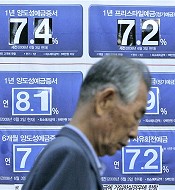VOA标准英语10月-Asian Stocks Plunge as Policymakers Seek to Shore(在线收听)
Thailand suspended trading on its stock market Monday, after it plunged nearly 10 percent immediately after opening. The so-called "circuit breaker" was invoked to ease the latest bout of panic selling. The Philippines also paused trading after stocks plunged more than 12 percent.
Hong Kong's Hang Seng index slid more than 12 percent for its lowest close in four years, and Japan's Nikkei dropped almost 6.5 percent for its lowest close since 1982.
Availability of international credit has constricted following major bank collapses in the United States. That, and predictions of a severe recession in the United States have dealt a beating to global stock markets for days. Investors have flocked to U.S. government securities and the dollar, which they perceive as safe - ratcheting up the exchange value of the dollar against Asian currencies.
Leaders of the Group of Seven advanced industrial economies, or G-7, voiced concern the Japanese yen is also becoming inflated. In a joint statement read by Japanese Finance Minister Nakagawa Shoichi, leaders reaffirmed a "shared interest in a strong and stable international financial system."
He says excessive volatility has an adverse effect on economic aid and financial stability. We will continue, he says, to watch moves in the foreign exchange markets.
Japanese officials say they are considering a massive capital injection into the country's banking system to try to offset the effects of the current crisis.
 |
| South Korean man walks past advertisement for bank's interests in Seoul, 27 Oct 2008 |
In South Korea, stocks finished slightly higher - thanks to robust central-bank action, and a detailed economic policy address by the South Korean president. The Bank of Korea slashed its key interest rate by three quarters of a percent - the sharpest cut in South Korea's history. The only other time the South Korean central bank cut the rate was after September 11, 2001.
President Lee Myung-bak went before lawmakers in hopes of reassuring his citizens and international investors.
Some raise a question, says Mr. Lee, about whether we can get over this crisis. The crystal-clear answer, he says, is "Yes, we can."
Mr. Lee adds, Seoul will expand government spending "boldly" to revitalize domestic consumption. He says there will also be tax cuts, more investment in social infrastructure, and support for small and medium-sized businesses.
President Lee quoted Depression-era U.S. President Franklin D. Roosevelt, saying the only thing to fear is fear itself. He urged South Koreans to have confidence that the lessons of the Asian financial crisis ten years ago increased the stability of their country's economy. Mr. Lee is scheduled to join other world leaders next month in Washington for a summit on the financial crisis.